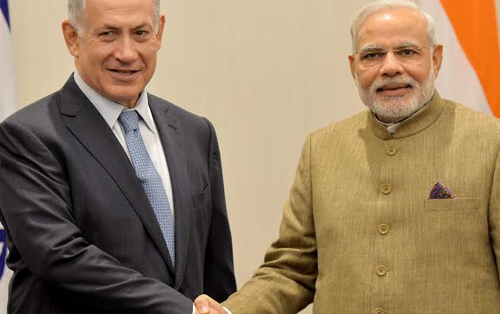East Jerusalem, Oct 13: Angry Palestinian students today protested against India's growing friendship with Israel at a university campus here today while President Pranab Mukherjee was there, forcing cancellation of one of his engagements.

Hundreds of students shouted slogans and carried placards critical of India's ties with the Jewish state while Mukherjee was being honoured by Al-Quds university at Abu Dis with an honorary degree and hailed as a "Knight of Peace".
After the university function, Mukherjee was to inaugurate a secondary school for boys named after Jawaharlal Nehru. But the function was called off due to the tense situation.
Mukherjee soon left for Israel, a short journey by road, on the first-ever visit by an Indian President.
The protesting students carried placards with slogans "India why do you cooperate with the occupiers (Israel)", "Indian President raise your voice against Israel's aggression", and "Indian President don't keep quiet against the butchers slaying Palestinians" as Mukherjee was leaving the campus here in East Jerusalem.
The demonstration came in the middle of heightened tensions and more killings between Israelis and Palestinians which have resulted in hundreds of casualties, including some today.
Inside the university auditorium, where Palestine Prime Minister Dr Rami Hamadallah was among those present, Mukherjee was hailed as "a Knight of Peace" and loudly cheered when he mentioned all the help rendered by India to the Palestinians.
In his acceptance speech at the university, the President said peace and stability in the Middle East region is in India's interest and proposed a three-pillar framework to propel its "historic" ties with Palestine besides building a second Information Technology (IT) centre in Gaza.
Mukherjee, who is in Palestine in the first-ever State visit by an Indian President, also announced an increase in Indian Technical and Economic Cooperation(ITEC) scholarship programme slots for Palestine to 100 per annum and setting up of an India-Chair at the Al-Quds University.
On Sunday, the President was conferred with an honorary degree in political science by the University of Jordan in Amman. On Thursday, he will be conferred a honorary doctorate by the Hebrew University in Israel.
Mukherjee delivered the speech after the inauguration of India-Palestine Centre for Excellence in Information and Communications Technology(ICT) in Al-Quds University.
"India will build a similar Center in Gaza. We look forward to the success of the Techno-Park in Ramallah. It will be jointly built and operated by the Palestine Investment Fund and the Indian public and private sector," he added.
Mukherjee said this will have a satellite centre in Ramallah and forward linkages with industry.
The President also gifted to the IT Centre of Al-Quds University 30 computers from India without the sophisticated communication equipment, which was held by the Israeli customs on grounds of security. India plans to replace the communication equipment not permitted by Israel with frequencies acceptable to Israel.
The President said the conferment of the doctorate on him was a sign of friendship and regard of the people of Palestine for India and for him.
He told the assembled audience that the university's pursuit of scientific knowledge and advanced research placed it at the centre of Palestine's national development programme.
Mukherjee said "India shares the perception that the Palestinian issue is at the centre of Arab-Israeli conflict. Peace and stability in the region is in India's interest."
Noting that the speed with which an event happening in one place of the world triggers a response in another is unprecedented in terms of its impact and scale, the President said maintaining regular contacts at all levels is, therefore, important.
Stating that India has always been at the forefront in promoting the Palestinian cause, the President said the strong foundations in this regard and shared belief in peace, prosperity and development for the people of Palestine "propel us to do more."
He referred to India's backing to several UN resolutions on Palestine to show its solidarity with the Palestinian people.
Mukherjee said one of the aims of his visit to Palestine is to suggest a framework for the future of India's relationship with it.
Noting that India continues to follow its traditional policy on Palestine, the President said the framework of their partnership can be reinforced through three principal pillars.
"First, closer political interaction; Second, deeper economic engagement and academic collaboration; Third, wider cultural contacts and people-to-people exchanges."
The President congratulated the people of Palestine on the momentous unfurling of their national flag at the United Nations-for the first time in history-on September 30, 2015.
Apart from our bilateral trade in goods, the President said there is vast scope for trade in services.
"India's strength in IT and IT-enabled services as well as consultancy can pave the way for greater engagement in the IT sector," he added.
The President also said that Government of India’s 'Make in India' scheme welcomes Palestinians to manufacture in India.





Comments
Add new comment